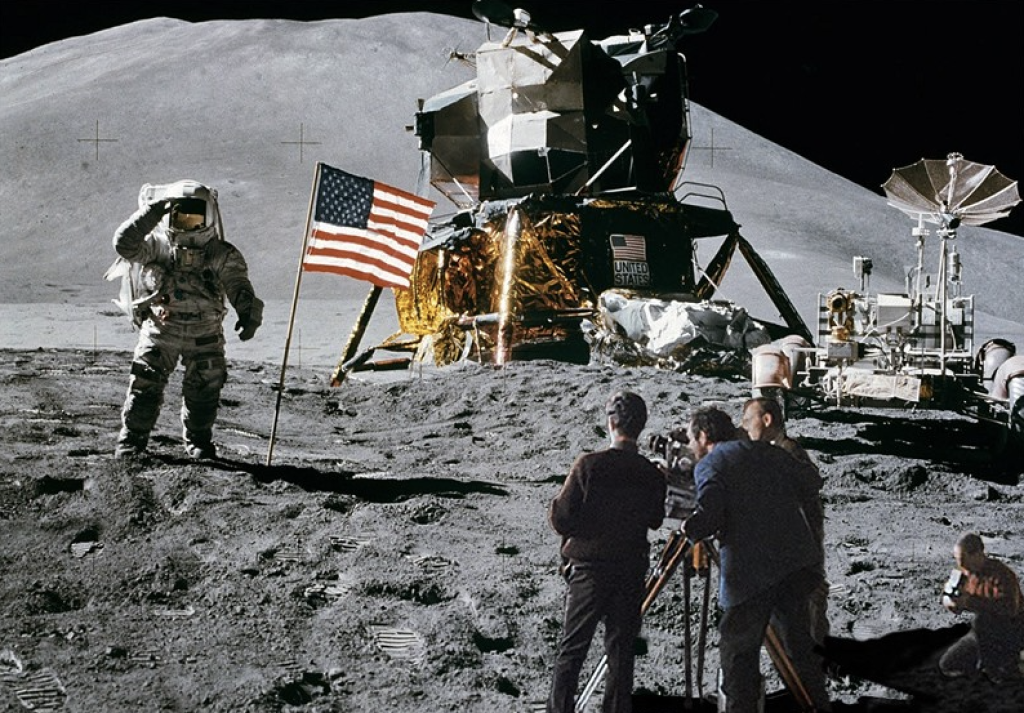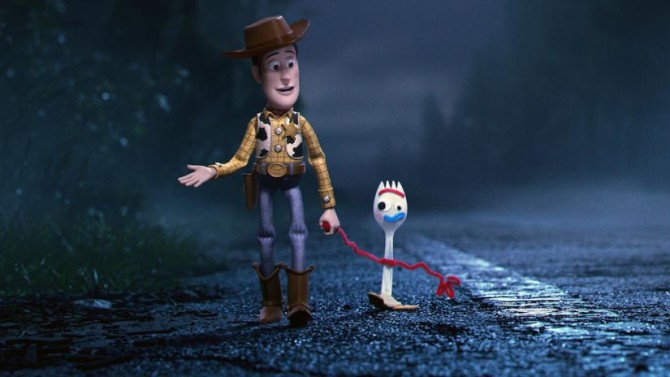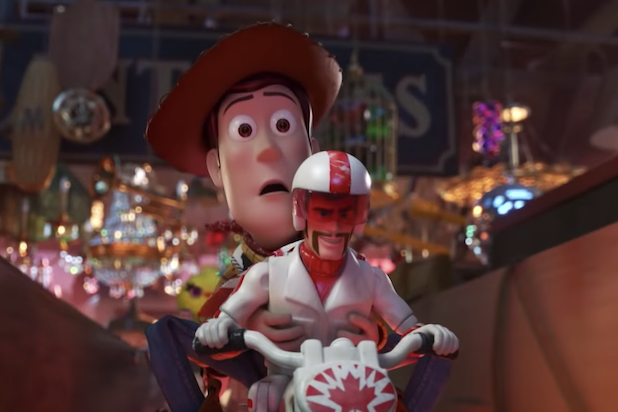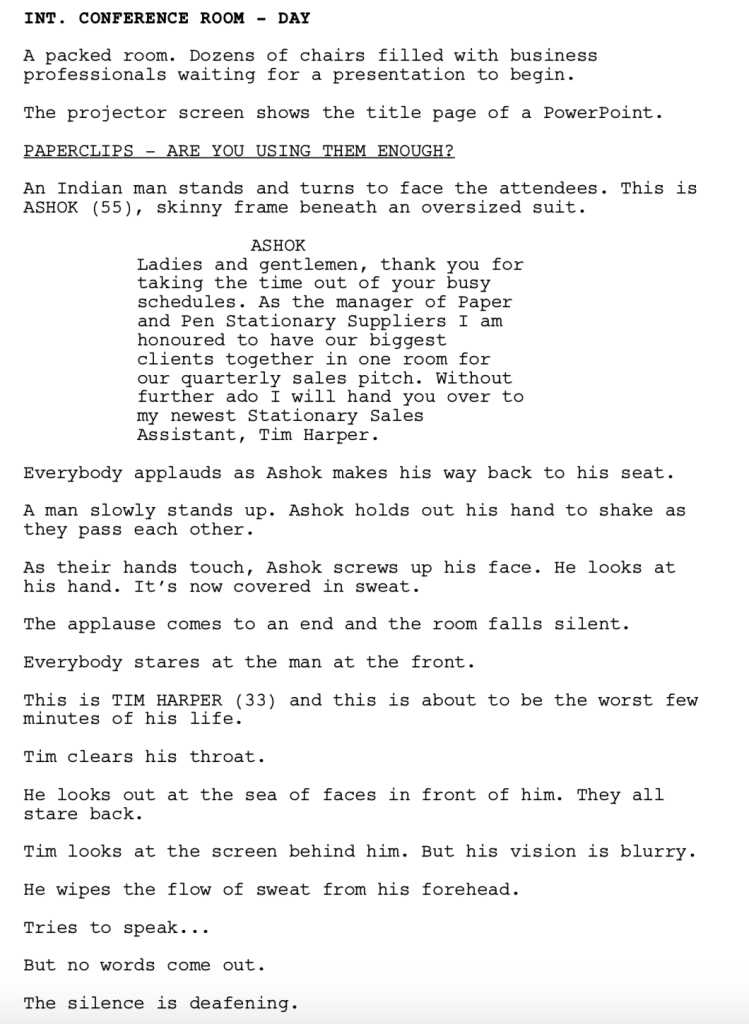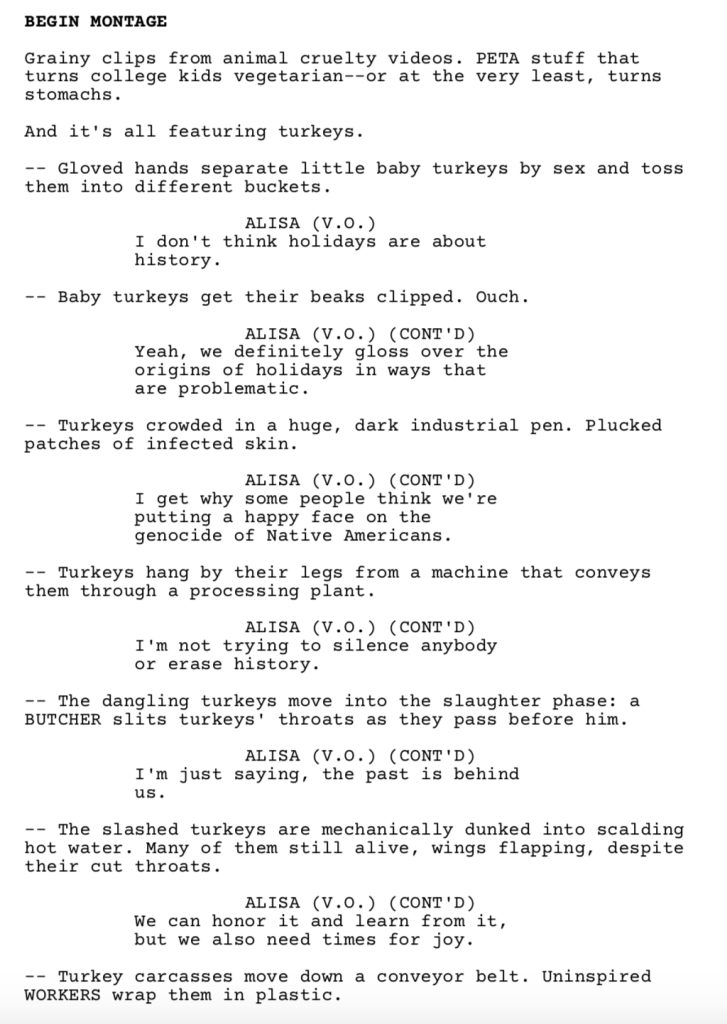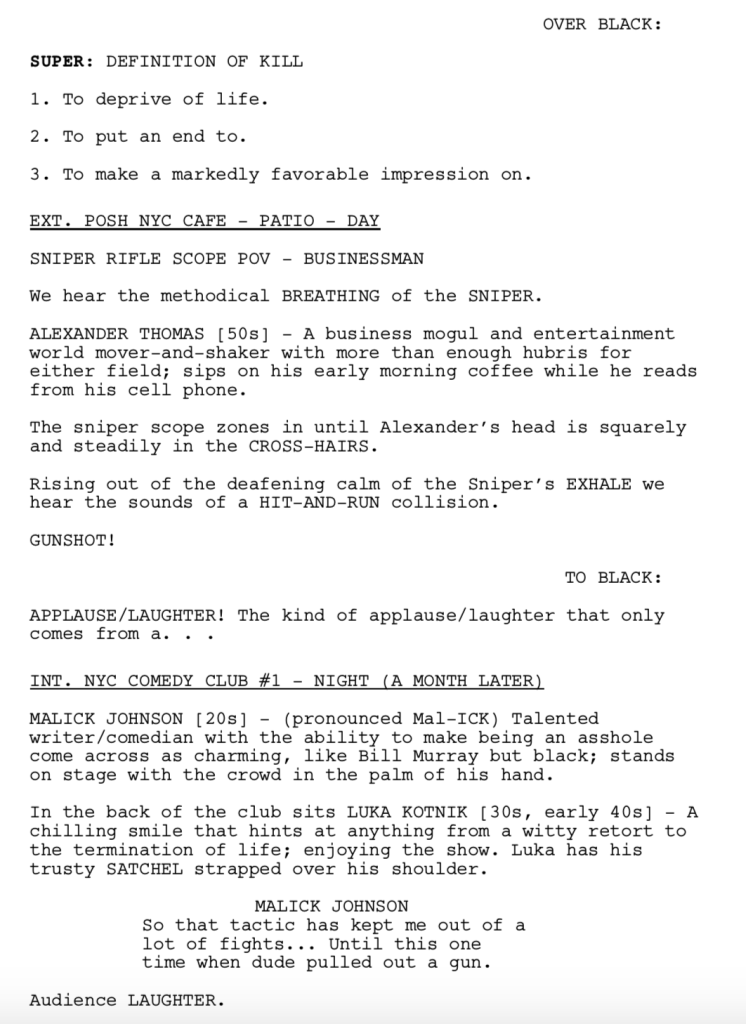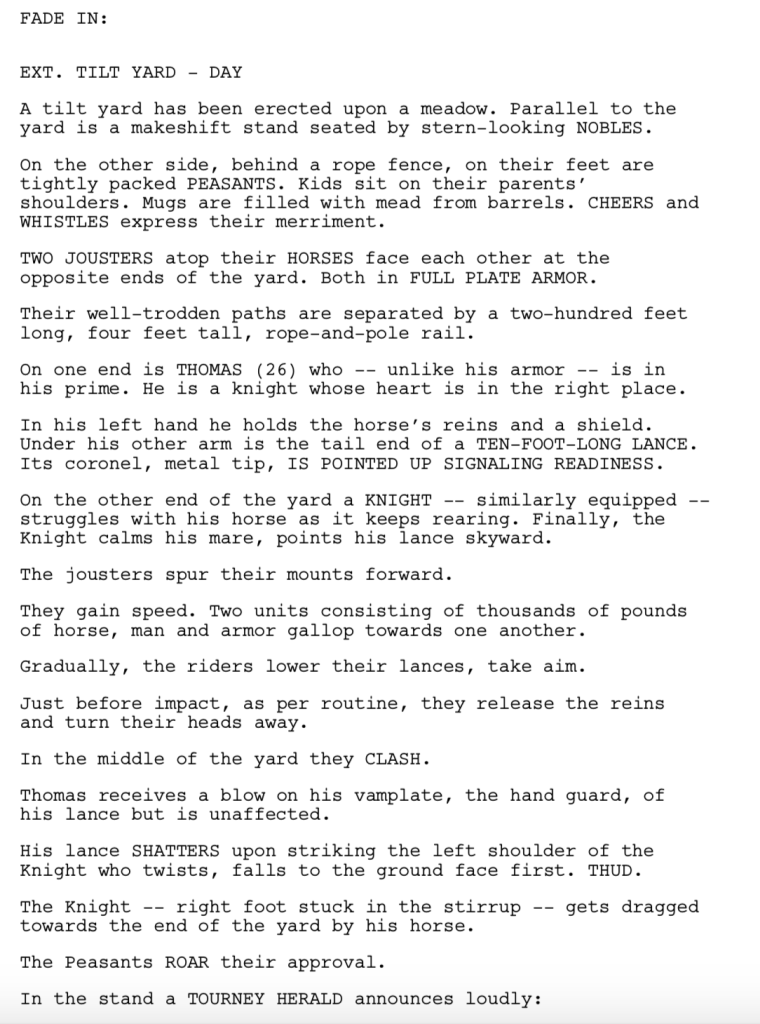Over the next five Thursdays, I’m going to be talking dialogue with the Scriptshadow Community. We’re going to be exploring the five main factors that go into writing strong dialogue, and today we’re starting with scene prep. The objective of this post is to show you how to prep a scene in order to get the best dialogue out of it.
Before we get into what you should do, it’s important to understand what not to do. As a screenwriter, we’re taught to look at scenes as situations that move our story forward. For example, as you plan your scene, you may think, “I have to have Chloe tell Jack about the time machine glove here so that when they meet up with Dr. Frank after the graduation scene, they can go back in time that night.” In other words, you see the scene as a means to communicate information as opposed to an entertaining experience in itself.
That’s the switch I want you to make in your mind. Of course you want your scenes to push the story forward. But what’s more important is that each individual scene be entertaining. It may be scary to hear but three boring scenes in a row and the reader is out.
The most basic step in dialogue prep is making sure that one character in a scene WANTS SOMETHING. The reason for this is that it gives your character purpose. And when a character is purposeful, his words have meaning behind them. Words without purpose, without meaning, are lifeless. To see this in action, write up some dialogue where two characters don’t want anything from each other. See what comes out. I’m guessing a bunch of boring nonsense.
Here’s where things get fun. Once you have a character who wants something, you can set it up so that the other character in the scene doesn’t want to give it to them. Go write a scene right now where Nick wants to break up with Tara but Tara doesn’t let him. I guarantee that scene is going to have better dialogue than if Tara agrees with Nick that they should break up. By following this simple formula, you’ve added CONFLICT to your dialogue. And conflict is where most great dialogue lies.
While this setup works great, not all conversation is this cut and dry. To be honest, if you only wrote scenes where one character wanted something and another character didn’t want to give it to them, the script would get repetitive fast. Conversation is more varied and nuanced than that. However, I want you to master this basic setup, because we’re going to use it as a jumping off point for all the other dialogue situations.
A close cousin to the “want – don’t want” setup is the “talk – no talk” setup. This is where one character wants to talk about something and the other character doesn’t. How many times have you been in a relationship or a marriage where you came home and your spouse hits you with the last thing you want to talk about in that moment? That’s an ideal dialogue situation right there. I actually think one of the most fun types of scenes to write is a “talk – no talk” where the secondary character literally says nothing the whole scene. Character A is the only person who talks in the scene. These scenes are always good.
Because conversation is so complex, these two setups are not going to be enough to complete the 40 odd dialogue scenes you’ll write in a screenplay. There will be a number of scenarios where neither character wants something and where both characters want to talk to each other. How do we still make the dialogue pop in those situations? It’s called the “Tension Question.” When dialogue lacks bite, simply ask the question, “Where is the tension coming from?” If you don’t have any, the dialogue will lack spark.
An example of tension is sexual tension. I was watching The Office the other day and Michael Scott was talking to his female boss and neither of them wanted anything from each other. But the scene worked because there was sexual tension bubbling up underneath their conversation. You could even make the same scene work if the sexual tension was one-sided. AS LONG AS THERE’S TENSION. That’s how important the Tension Question is.
Yet another great dialogue setup is to introduce an external problem into the scene. A problem forces your characters to work the problem out. But wait. Doesn’t that violate our first dialogue commandment, which states that our characters can’t want the same thing in a scene? Actually, the tension comes from a slight adjustment. They may want the same thing, BUT THEY’LL HAVE DIFFERENT OPINIONS ON HOW TO GET IT. Have you ever tried to lift something really heavy with people you barely know? Within seconds, you’re getting wildly differing opinions on how to execute the task at hand: “No no no, you got to be in front.” “Wait, you should put your hands here, not there.” “You’re the tallest so you should be in back.” If characters want the same thing, they should have differing opinions on how to get it. That’s going to inject the necessary tension.
These final three structural tips aren’t required for great dialogue, but if your dialogue is lacking punch for some reason and you can’t figure out why, try throwing one of these in there. STAKES. The more that’s on the line, the more the words will matter. Think about a scenario where absolutely NOTHING is on the line. Say you’re meeting up with a friend for coffee. Neither of you want anything from each other. This is a zero stakes conversation which means it will be 100% boring. What if, however, using the same setup, Character A needed to borrow a large chunk of money from Character B to pay off his bookie, or else that bookie is going to break his jaw tonight? Granted, that’s an extreme scenario. But do you see how stakes increase the conversation’s worth? It doesn’t need to be this drastic every time. Just ask yourself, “What’s on the line in this scene?” If nothing is on the line, putting ANYTHING in there will improve the dialogue.
The second tip is URGENCY. A conversation where characters have all the time in the world to chat away is usually a boring conversation. For this reason, you want to put a time constraint on your conversation. I was watching a TV show not long ago and Character A needed to talk to Character B about something important. The writer didn’t have the two meet later for a beer to discuss the issue – a place where they would’ve had an endless amount of time. Instead, Character A came to Character B’s work. Character A spotted him in a meeting and waved him out. Annoyed, Character B came out and said, “What are you doing, I’m in the middle of an important meeting,” and Character A laid the issue on him. Of course, he had to hurry because Character B’s coworkers were waiting for him to come back into the meeting. Lack of time equals pressure. Pressure equals tension. Tension is conflict. Conflict is entertainment.
Finally, we have circumstance. When and where a conversation is had will have a major influence on what’s being said. The same conversation plays differently in a bedroom than it does in a plane than it does at a wedding than it does in the supermarket line than it does at a funeral. That’s because different circumstances create different levels of tension (not to mention different types of tension). A good rule of thumb is that if a conversation is going to be entertaining on its own, you don’t need to think too hard about circumstance. But if your conversation is weak, try altering the circumstance to a time and place that’s going to add more tension.
That’s all for today. Come back next week where we’ll talk about character. In the meantime, you better be writing a bunch of practice dialogue scenes with these tips in mind!
Carson does feature screenplay consultations, TV Pilot Consultations, and logline consultations. Logline consultations go for $25 a piece or $40 for unlimited tweaking. You get a 1-10 rating, a 200-word evaluation, and a rewrite of the logline. They’re extremely popular so if you haven’t tried one out yet, I encourage you to give it a shot. If you’re interested in any consultation package, e-mail Carsonreeves1@gmail.com with the subject line: CONSULTATION. Don’t start writing a script or sending a script out blind. Let Scriptshadow help you get it in shape first!
Genre: Spy
Premise: When a U.S. physicist defects to North Korea carrying a mysterious suitcase, old school CIA agent Leo Diamond is tasked with helping some young CIA upstarts prevent another Snowden situation, or worse.
About: This script sold in 2014 for high six figures. It was written by Ken Nolan, who scripted Black Hawk Down and who was ripping off a number of big spec sales during the time. Nolan was reportedly obsessed with the book on which the script was based, pitching it to everyone in town. Nobody wanted anything to do with it. That is until he changed the setting from the Cold War to the present day, where it could be pitched as an “Edward Snowden” like spy story.
Writer: Ken Nolan (based on the novel by Robert Littell)
Details: 116 pages
Honestly, if I were a writer desperate to sell a script, I would type “spy novel” into the Amazon search bar and go down the list of books that come up. Find the lesser known books, the ones that have less than 200 reviews, and look for a concept you like. As soon as you find one, get in touch with the writer and ask for the rights to adapt the book. Doesn’t matter which direction the breeze is blowing in Hollywood, they ALWAYS buy spy scripts. Always always always. The trick is finding one with an electric main character that you can build a franchise around.
The Defection starts with a fat man discreetly following a skinny man through the streets of Hanoi, Vietnam. We get the impression that the fat man has been tasked with doing this for awhile and doesn’t believe the skinny man is worth the trouble. Either that or he’s looking for an excuse not to have to run around the city so much. That lazy attitude ends up costing our blubbery buffoon, as the skinny guy disappears, and is found on CIA security cameras 48 hours later walking into the North Korean Embassy with a large suitcase.
We learn that the man’s name is A.J. Lewinter, a respected but introverted American physicist and computer hacker. It is the CIA’s belief that Lewinter is going to the North Koreans to sell them something, possibly information about the U.S.’s nuclear missile program. Young buck CIA agents Billings and Ferri see this as an opportunity to make a name for themselves, revving up their millennial mind muscles to take this dude down. But their boss, Winton, has other ideas. He wants them to team up with 50-something dinosaur agent Leo Diamond. Winton believes that Diamond’s boots-to-the-ground old school approach is the key to figuring out what this dude is up to.
Ferri and Billings scoff but what can they do? Diamond struts in and nails the younglings with a forced monologue about the importance of high quality coffee in the CIA. As soon as the CIA coffee budget goes down, he tells them, the whole system falls with it. Naturally, Ferri and Billings think Diamond is nuts. But he’s only getting started. While Ferri and Billings think the key to the case is finding out what’s inside the suitcase, Diamond’s more interested in what’s going on in Lewinter’s head.
While Ferri and Billings use Google for the bulk of their research, Diamond heads out to talk to the people Lewinter knew, a co-worker at MIT as well as a couple of secret girlfriends he had on the side. They all seem to agree on one thing – Lewinter has a strict moral code. Which doesn’t jive with this North Korean defection at all. The deeper our agents dig, the more information they find on Lewinter. He’s not your average physicist. This is a guy who knows how the U.S. Defense’s missile array works. How the power grids in America operate. This is a man who, theoretically, could turn the entire United States off then blow it up. Which means they must act fast and stop Lewinter!
This is a cool little script.
When I read that it was a spy movie, I assumed it would be your typical James Bond knockoff. A fiercely intelligent effortlessly charming hero running around the world in search of his next set piece. But this story is actually more contained and realistic. Our heroes aren’t baking fake face masks to trick stuffy tuxedoed men with thick Eastern European accents. They’re in boring offices a million miles away from the problem, and time is running out for them to figure out who their traitor is and what he plans to do. It reminded me of that great little British drone movie from a couple of years ago, Eye in the Sky.
With spy movies, I’m always telling writers, “What makes your spy movie different?” You should ask this question of every genre, of course. But especially this one because it’s such a formulaic genre. There’s nothing more boring than a generic spy movie. So setting this up as a contained CIA thriller and making it a 24 hour mystery where the entire world is at stake was a welcome diversion from the snore-worthy Ethan Hunt clones I’m used to reading (how many times can one man blindly ride his motorcycle 100 miles an hour through an 8 lane intersection and not get hit????).
My biggest issue with the script was that despite the perfect movie character name, Leo Diamond wasn’t that distinctive as a character. For example, we’re told that he’s old school. That’s the whole reason they bring him in. But one of the first things he does is call on the local police to jump into their computer archives and retroactively give Lewinter a lengthy criminal record. That seems a lot more like a new school move to me.
Also, you want to make an impression with your hero’s entrance. Especially in a genre like this where we’re meant to believe that this guy is special. Charging in with a big long fun monologue is a perfectly acceptable way to achieve this. But if the monologue bombs, the character never recovers. We will always see him as the guy who spewed out that try-hard nonsensical rant about CIA coffee. I’m serious, guys. The stuff your hero does in their first few scenes is pivotal in winning over the reader.
I didn’t love 2012’s Jack Reacher but it had a great character intro. We see the entire FBI desperately trying to find Jack Reacher. It’s impossible, they’re told. Jack Reacher is one of the most skilled and hard-to-locate people in the world. As they chart out the effort and manpower and number of days it will take to find this man… Jack Reacher just walks through the door and says hi. No big silly monologue. Just one simple cleverly-executed action and we love this guy.
Luckily, the script overcomes this hiccup. The setup is too fun not to work. In addition to what I’ve mentioned, The Defection uses one of the more entertaining tropes in the genre – which is to either take a new school problem and inject an old school character into it, or take an old school problem and inject a new school character into it. The reason this works is CONTRAST. Contrast = conflict = drama = entertainment.
If you even casually like the spy genre, you’ll like this script.
[ ] What the hell did I just read?
[ ] wasn’t for me
[x] worth the read
[ ] impressive
[ ] genius
What I learned: If your script isn’t working, try playing with the setting. For example, if your script is set in 2019 and it feels dead, ask what it might look like if it were set in 1969. Or 1929. Or 1984. Everything about this idea seemed boring to Hollywood when Nolan was selling it as a Cold War story. By shifting the setting to modern day, it all of a sudden came alive.
Genre: Drama/Period/Conspiracy
Premise: A young upstart at NASA suggests that in order to beat the Soviets to the moon, the US have Stanley Kubrick fake the moon landing.
About: For those of you who caught yesterday’s post, Stephany Folsom is the co-writer of Toy Story 4. She got that job after writing this script, which made the 2013 Black List. Pixar is known for finding fresh writers who write darker/sophisticated material, presumably because they like themes that go further than skin deep. Folsom’s influences include Lou Reed, Steven Soderbergh, Kurt Vonnegut, Jean Renoir, and John Hughes.
Writer: Stephany Folsom
Details: 10/13 draft – 115 pages
One of the downsides of the Black List is that 70 scripts all get bunched up together with one big thumbs up and you don’t know which of them are actually good. The only way to find out is when they get written up on other sites and the only site that goes through them to find out is, well, this one. So until I read a Black List script myself, I never know what’s good. Apparently, this script was featured in several publications outside of the Black List and therefore was one of the few scripts getting legit endorsements (as opposed to making the list because an ambitious agent lobbied a bunch of development kids to vote for his client’s script). How I missed it? I don’t know. But, hey, better late than never.
It’s 1969 and two American spies in the Soviet Union have determined that rising leader Mikahil Suslov is less than a month away from launching a manned mission to the moon, three full months before the US will send their team. The American government believes that if the Soviets beat them to the moon, Suslov’s power will skyrocket and he will initiate an all-out nuclear attack on America.
A little known U.S. government NASA liaison named Barbara comes up with a solution for this: Fake the moon landing. Everyone ignores her until she gets an official government letter approving her request. Barbara believes there’s only one man for the job: eccentric director Stanley Kubrick. She practically barges into his home and makes her pitch. Kubrick declines until Barbara offers him an elusive government-made camera lens that can shoot in lower light than any other lens in the world. Kubrick is in.
The kooky Kubrick begins playing his games immediately, waiting until Barbara has driven him to the airport to tell her he doesn’t fly. She’s forced to drive him from New York to Florida. Once there, nobody at NASA seems to pay attention to Barbara and Stanley’s sideshow. I’m not sure why since I thought this was the key to saving the world. Kubrick busts out all the hits. He only communicates with Barbara via written notes. He shoots until the astronauts physically can’t move anymore. And after entire sets are built to his particularly stringent standards, he decides at the last second to tear them down and start over again.
At the last second, Kubrick decides to quit. Despite everything he shot being perfect, he never filmed the astronauts walking out of the module onto the moon – the most important part of the whole movie! So it will be up to Barbara to find Kubrick and convince him to come back, film the ending, and save the free world.
I’ll cut straight to the chase. Your reaction to this script will depend exclusively on whether you’re a Kubrick fan or not. If you love Kubrick’s movies and you love all the rumors surrounding his eccentric directing style, you’ll flip for this. Me, on the other hand, I’ve never connected with Kubrick’s work. It’s too dark and nihilistic for my taste. So while I love the stories about what a weirdo Kubrick was (i.e. doing 60 takes in a row and never asking for anything different from the actors), I’m far from what you’d call a Kubrick sycophant. Which is probably why I didn’t respond to this script the way others have.
My first issue with the script is that it’s too dry.
The characters only speak to say what the writer needs them to to move the plot forward. Outside of Kubrick, they don’t have a life of their own. They all sound exactly alike – government drones trying to do a job. Even Barbara. If you’re worried that your dialogue isn’t up to professional standards, this script should give you hope. The dialogue here is as standard as it gets and it made the Black List.
The bigger issue, however, is how unclear the overall goal is. While I knew they were filming a fake moon landing, it was never clear how it was going to be used. We’re being told that, concurrently with Kubrick shooting the landing, NASA is still going forward with the real trip to the moon. So was this a backup plan in case they didn’t launch in time? Was it to be used in conjunction with the launch (show the launch then cut to the fake moon landing footage)? Was NASA going to try a moon landing the legit way, and, if they didn’t make it, throw the fake footage up at the last second? Was the plan not to televise the launch and just say to the world that they’re at the moon then show the fake footage?
A big reason this was so hard to follow was because Barbara’s fake landing was a side hustle nobody in the White House or NASA cared about. It made the whole movie seem like it didn’t matter. Honestly, half the time we’re with Kubrick on set, it feels like play time. An excuse to get to the next Kubrick shenanigan.
That’s not to say there weren’t stakes. If Russia’s top engineer beats the U.S. to the moon, he would win the presidency and launch a nuclear war against America. But that only confused the narrative more. If it was so important that this fake landing work, how come nobody in government was paying attention to it?
If I’m being completely honest, I don’t think the writer thought about anything other than the Kubrick/Barbara scenes. These are the only scenes that pop. And I use that word generously. Outside of the scenes with Kubrick screwing around, we haven’t got one character who stands out. Not to mention a plot with an extremely hazy goal.
Here’s the thing with readers. Every time we see a script with a good concept, we prepare ourselves for one of two outcomes. Either the writer is going to give us exactly what we’re expecting from the concept. It will be serviceable and nothing more. Or the writer is going to elevate that concept into something way better than what we imagined. This script definitely lies in the former pile. There’s nothing here that a thousand other screenwriters wouldn’t have done with the same idea. It honestly seems like an excuse to write eight scenes where Kubrick is acting like a weirdo. Everything else is tossed in there to fill up space.
And that sucks because I was really looking forward to this script. I guess it goes to show that when you get to work with the Pixar storytelling team, you are getting the best screenwriting help in the world. So many characters fall flat on the page here whereas in Toy Story 4, they’re all fun and memorable.
All right you Kubrick nuts – feel free to tear me to pieces.
[ ] What the hell did I just read?
[x] wasn’t for me
[ ] worth the read
[ ] impressive
[ ] genius
What I learned: That 2001 was originally deemed a failure. It only became cool when the hippie counter-culture began dropping acid and going to screenings. It then miraculously became a “masterpiece.” This helps explain why I never never saw what others saw in this film.
Is Toy Story 4 yet another unneeded sequel, like Dark Phoenix, or does this fourk-el fly like the phoenix?
Genre: Animation
Premise: When the toys’ new owner, Bonnie, makes a toy at her first day at kindergarten called Forky, Woody and the crew must ensure Bonnie doesn’t lose him.
About: Pixar’s flagship franchise is back! One of the cool things Pixar does is they pull a relatively unknown writer out of obscurity and pair them with the excellent story team at the studio. This time that writer is Stephany Folsom, whose script, “1969 A SPACE ODYSSEY OR: HOW KUBRICK LEARNED TO STOP WORRYING AND LAND ON THE MOON,” made the 2013 Black List. She was paired with Pixar mainstay Andrew Stanton, who’s had a writing hand in almost every one of Pixar’s movies.
Writer: Andrew Stanton & Stephany Folsom
Details: 100 minutes
I’ve decided I don’t care about box office results for movies with 100 million dollar advertising campaigns anymore. It’s not the best indicator of audience interest when a movie’s advertising campaign basically grabs you and shoves you into your theater seat. “How did I get here again?” you ask, as your face wears the scars of a relentless marketing attack that ensured every other image you saw for the past month was one of this movie. I mean does anybody really care if Avengers bests Avatar at the box office? It wouldn’t even be a true win when you take into account inflation. All I care about when it comes to these movies going forward is, are they good? Which is why I’m so excited about today. Because Toy Story 4 is good.
Let me take a second to praise Pixar because it’s amazing how they handle their franchises, particularly Toy Story. In a world where studios don’t produce a movie anymore without making sure it sets up a sequel (or five), Toy Story is that rarity where all they care about is making each movie a singular experience. At the end of each Toy Story, you leave thinking that’s the last Toy Story movie they’ll make.
The downside of doing it this way is if the studio DOES decide to make a sequel, it’s all wonky and unstable because it was never meant to exist. Joss Whedon famously demanded Avengers be made this way. So when they made a sequel, it couldn’t live up to the original. The first one was about saving the world. The sequel was about… a floating island and bad Russian accents?
One of the reasons Toy Story (and specifically Pixar) is able to overcome this pitfall is because they take the time to work on the script. Toy Story 1 came out in 1995. Toy Story 2 came out in 1999, part 3 in 2010, and part 4 in 2019. Avengers 1, meanwhile, came out in 2012 and the sequel 2015. That extra time allows the Toy Story team to come up with concepts, when the concepts are bad reject them, keep trying, keep looking for something that works, and once they have it, write, then rewrite, then rewrite another 30 times until it’s right. Pixar is the ONLY studio that does this. And it’s why we have another winner today.
If you haven’t seen the film, it follows Woody and the rest of the toys as they prepare for a reluctant Bonnie’s first day at kindergarten. Terrified of this new experience, Bonnie only becomes comfortable once she creates Forky, a spork-like toy who’s obsessed with trash (the spork part of his body came from the trash). Woody realizes that Forky is now Bonnie’s most important toy, the only way she feels comfortable at kindergarten. So it’s all hands on deck to make sure Forky doesn’t get lost, a difficult task since he’s always trying to throw himself away.
This goal becomes infinitely harder when Bonnie’s family goes on an RV trip and Forky is constantly trying to run away. At one particular RV park, Forky gets kidnapped by a 1950s doll named Gabby Gabby at a nearby antique shop. The doll will only give Forky back if Woody gives up his voice box, which Gabby needs in order to become factory new again (and finally get the attention of the shop owner’s granddaughter). So Woody recruits Little Bo Peep, two stuffed carnival prizes from the nearby carnival, Buzz, and a Keanu Reeves’ voiced Duke Kaboom, to save Forky, all before Bonnie and her family head out to the next destination.
There are too many strong screenwriting choices in this script to count. Let’s start with the MacGuffin. Again, one of the best ways to structure a story with a lot of characters is to create a MacGuffin, the item in your story that everybody wants. The reason for this is, if you have a story with a lot of characters and no MacGuffin, you have to come up with individual goals for each and every character (or groups of characters). That’s infinitely harder to do. In the case of Toy Story 4, Forky is our MacGuffin. So even though there’s a lot of plot going on here, it’s never confusing because we always know that, at the center of the story, everyone’s trying to get Forky.
Another winning choice was to create a complex villain in Gabby Gabby. One thing I try and remind everyone is that when it comes to villains, playing against type can lead to a more memorable character. What’s less objectively threatening than a 2 year old girl? That’s our villain in Toy Story 4. On top of that, Gabby isn’t a villain just to be a villain. She has a goal. She needs Woody’s working voice box to replace her own broken one. On top of this, there’s an actual motivation for this goal. It isn’t just to be new. She’s hoping that the antique owner’s granddaughter will finally want to play with her if her voice box works. It’s an extremely strong emotionally-rooted goal/motivation, which is why Gabby Gabby is such a strong villain.
Understanding they can’t make Gabby too evil, lest she can’t be redeemed, the writers offload some evilness to Gabby’s minions, the creepy band of ventriloquist dummies who do her bidding. It’s choices like these that make the screenwriting in Pixar movies stand out. Because, when you think about it, most writers would’ve just made Gabby evil for evil’s sake. And even those who wanted a more balanced character wouldn’t have realized that extra evil characters were needed to fill in the evil gap.
Yet another awesome thing about Toy Story is the set pieces. I always tell the big idea screenwriters out there: find concepts that allow you to write original set pieces. One of the reasons the Toy Story franchise is so popular is because it’s so easy for the movies to give us set pieces we haven’t seen before. While the Fast and Furious franchise desperately attempts to find one last original car chase set piece, the shrunken down world of toys can build an entire set piece around an antique shop with an island cabinet tower that can only be accessed by a Duke Kaboom motorcycle stunt. That’s one of numerous set pieces in the film that feel like sequences we’ve never seen before. Remember that, in the end, the goal is to get people into the theater. If you’re not offering them something they can’t get anywhere else, they’re not going to come.
One of the trickiest things Toy Story 4 does is set up its stakes. Remember that these event movies don’t work unless the stakes are high. This is why, usually, the world (literally) will be at stake. Heck, in Avengers Endgame, half the universe is a stake. But not every movie is built that way. You can’t put the world at stake in a Toy Story movie. What you can do, ironically, is the opposite. You can focus on something narratively small but emotionally large. In this case, that’s Forky, or more specifically, who Forky is to Bonnie.
Toy Story 4’s biggest accomplishment is in how deftly it sets these stakes up. It does so with a single speech from Woody to the rest of the toys. He explains that Forky is Bonnie’s most important toy at the moment because it’s the key to her feeling comfortable at kindergarten. To be honest, I’m not entirely sure how they pulled this off. Somebody telling you the stakes of the movie is never as good as the stakes being revealed organically through plot (we learn how important R2-D2 is in Star Wars because Darth Vader is so relentlessly determined to retrieve him). But after Woody’s speech, we’re on board with saving Forky because the stakes are so soundly anchored in emotion (Bonnie needs him for emotional support). By the way, for all you beginner writers out there, you have to know that this scene is required in the first place. If we don’t understand the stakes of the movie, we’re not going to be invested. If Forky is just a new toy that the team doesn’t want to lose, the movie doesn’t work.
Some of the other things I liked were the ventriloquist dummies, specifically the way they moved. They nailed the creepiness of those dolls. The way they explained Duke Kaboom’s backstory was hilarious (the boy received him as a Christmas gift then discarded him because he couldn’t do the same jump he did in the commercial – “It was a commercial! You can never live up to the commercial!” Duke pleads to no one). I wanted a teensy bit more from Forky but he was fun. And I felt Gabby Gabby’s arc was expertly executed. I loved the red herring (“You can be Bonnie’s doll”) only – SPOILERS – for her to end up with a different girl lost at the park.
And, finally, probably the secret sauce of the Toy Story franchise is how perfectly they tap into the human condition. The stuff about Gabby believing that if she just gets her voice box then she can finally achieve what she wants in life is a metaphor that pretty much anyone in the world can relate to (if I can just get more money, if I can just lose these 20 pounds, if I can just get a car, if I can just finish this screenplay). Never underestimate the weight of tapping into those universal human experiences.
It’s too early for me to rank where Toy Story 4 falls in the Toy Story franchise. All I know is that I loved it. The script was so impressive, in fact, that I want to read that Stanley Kubrick script Folsom wrote to get the gig, which I’ll review tomorrow!
[ ] What the hell did I just watch?
[ ] wasn’t for me
[ ] worth the price of admission
[x] impressive
[ ] genius
What I learned: Folsom got her manager (Kaplan/Perrone) by working with some producers on a TV pilot that never took flight. A lot of writers are so focused on getting that agent or manager first, but usually it happens the other way around. Find some people who are in the business, even peripherally, and work on something together. Nothing may come of the project, but you’ll have access to the people they know, which may get you that coveted representation you’re looking for. Or at least a shot at it!
I received an all-timer screenplay e-mail query. I can’t give you the whole thing but here’s the heart of it: “I have ten scripts, but I’m sending 10 query letters (summary) with my bio (last page of Query-10 script) first and then you can decide which one someone you’ll refer to make a movie out of one or more of my scripts. I hope you don’t think it’s too long or too much to read. I put full query letter if you want to read straight through and individual query letter just in case you give my query letter to more than one person. I have scripts on copyrights and WGA just in case of theft.” Ten scripts were attached. Dear lord. Do some research before you send out a query like this!
If you haven’t played Amateur Showdown before, it’s a cut throat single weekend screenplay tournament where the scripts have been vetted from a pile of hundreds to be featured here, for your entertainment. It’s up to you to read as much of each script as you can, then vote for your favorite in the comments section. Whoever receives the most votes by Sunday 11:59pm Pacific Time gets a review next Friday. If you’d like to submit your own script to compete in a future Amateur Showdown, send a PDF of your script to carsonreeves3@gmail.com with the title, genre, logline, and why you think your script should get a shot.
By the way, if you don’t like the concepts (and there are some issues with concepts this week) don’t say stuff like, “These concepts blow! What were the writers thinking??” Instead, help them. Constructively explain why the concepts don’t work for you. To the writers this week: Concept is one of the more subjective components of screenwriting. So if you get one or two “weak concept” comments, don’t toss the script. But if you’re getting more than that, you might want to listen to the complaints.
Good luck!
Title: Dreading The Wedding
Genre: Comedy
Logline: With the help of a charismatic but crazy mentor, a groom-to-be attempts to overcome his fear of public speaking before his dreaded wedding day speech.
Why You Should Read: Public speaking amazingly ranks as the number one fear in society. Even ahead of such terrifying things as death, spiders and getting a bad review on Scriptshadow. Many men with this fear can go their whole life avoiding giving any kind of a speech. Until their wedding day. Then they are given a microphone and expected to entertain a room full of drunken guests. Good luck. There have been many wedding comedies that have tackled the other issues of the big day, like finding a best man, finding a date, even losing the groom and finding him again. But none about overcoming the most common fear in society. If that’s not enough then I at least think the title is pretty catchy and can become the motto for anyone attending weddings against their will this summer.
Title: Carve
Genre: Horror, Home invasion
Logline: A diehard vegetarian must survive the Thanksgiving dinner from hell when murderous animal rights activists invade the home of her boyfriend’s family.
Why You Should Read: I wrote CARVE last Thanksgiving over the course of three days (don’t worry, I spent a lot of time getting feedback and editing after that). Despite the relatively quick first draft, I’m more pleased with the script than many of my projects that have taken twice the time.
With CARVE, I applied an animal-rights angle and a dark sense of humor to a budget-friendly Thanksgiving home invasion story. It’s a nasty, lean 89 page read, inspired by the likes of GREEN ROOM, YOU’RE NEXT, and THE INVITATION.
Based on positive responses from peers and Black List (“CARVE is a highly original and horrifying script with many disturbing twists and turns”), I hope you all will enjoy the read and have some advice for the next draft.
ENTRY REMOVED – WRITER REPPED AND NOW SHOPPING SCREENPLAY – :)
Title: Goodnight Kill
Genre: Dark Comedy
Logline: A standup comedian and a Russian assassin trade services for a night.
Why You Should Read: I have written for The Eric Andre Show, @midnight and a number of commercials. This script received a Recommend from the coverage people at Bloodlist.com.
Title: ONCE UPON A HEIST
Genre: Fantasy / Action
Logline: A down-on-his-luck knight is recruited by a group of thieves to steal the king’s most treasured possession — the goose that lays the golden eggs.
Why You Should Read: I wanted to find a fresh angle into an old genre. What resulted is a heist story set inside a fairy tale world. In its center is a good-hearted protagonist who struggles between doing noble deeds and necessary evils. The narrative has an ironic premise alongside a strong objective. It’s filled with conflict, action and thrills and it touches on topics that are relatable in our modern times. On top of all that it has commercial appeal. I hope the ScriptShadow community can offer its invaluable input to further my quest to make this script the best it can be.



